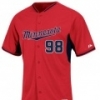Can the 2013 Twins Compete? You Betcha!
Twins Video
Originally published at The Tenth Inning Stretch
---
I think that it is pretty safe to say that nobody expects the Minnesota Twins to be close to contending in 2013. As a matter of fact, a lot of fans and experts would find the new Accuscore predictions that were released today and show the 2013 Twins with a predicted record of 72-90, optimistic.
I usually do not try to predict the way the Twins will finish with an analysis. The last time I did it was in the aftermath of the Santana trade and before the 2008 season, when the sky was supposedly falling (you can find that analysis in parts: Part 1, Part 2 and Part 3.) My quite unorthodox calculations predicted the team to have an 89-73 record, while everyone was predicting a sub .500 record. That season, as in this season, the major breaking point is Starting Pitching.
When I was asked before Spring Training by Cardinal70.com in their playing pepper series, my prediction (gut feeling) was that the Twins will compile an 86-76 record and will be competitive in 2013. Additionally, I recently noted the good energy that I saw this team have in Fort Myers, which makes me optimistic for 2013. Add to this, this excellent analysis by Phil Macky at ESPN 1500 based on individual projected performances that project the Twins to win 80 games in 2013, and it was about time to look at the possibilities formally.
I looked at it in 2 different ways and this post is part one, looking at the possibilities of the new starting rotation. The second way will be a WAR- and RAR-based analysis that will be presented some time this weekend or so, otherwise this post will be a monster.
This analysis is pretty unorthodox but pretty close to what I did before the 2008 season. I am looking at the differences of the Twins' rotation in 2013 vs the Twins' rotation in 2012 (Starting pitching is the driver of the Twins' performance folks... They led the AL Central in position player WAR by a lot, 25% ahead of the second team, in 2012.)
I am looking at the following two measures for each starting pitcher in 2012:
- Bill James' Game Score (which is what I used to tabulate my Spring Training Dashboards, and use the same convensions for above average, below average and average as there; explanation is here)
- Earned runs a pitcher allowed in each game
- Then I tabulate the number games that each pitcher had game scores better than, worse than or average; and the number of games that each pitcher allowed 2 runs or less, 3 to 4 runs and 5 runs or more. (Note: The Twins scored about 4.3 runs a game, so =< 2 runs is high probability or win and 3-4 runs good probability for a win.)
- The 2012 Twins' starters used for the calculations are Pavano, Blackburn, Liriano and Marquis
- For the 2013 Twins' startes I used the 2012 numbers for Correia and Worley and the 2011 for Pelfrey and Harden
- I assume that the rest of the rotation in 2013 (Diamond, De Vries, Deduno etc) will perform as in 2012.
Here are the results by pitcher:
It is obvious that the 2013 rotation had many better games in 2012 and would have kept the Twins competitive in most of their games (4 runs or less) than the 2012 rotation. But how much?
- The 2013 rotation had above average game scores 48.3% of the time vs 23% for the 2012 rotation
- The 2013 rotation allowed less than 2 runs in 42.7% of games vs 26% for the 2012 rotation
- The 2013 rotation allowed less than 2 runs in 82.2% of games vs 61.2% for the 2012 rotation
What does this mean in wins for the 2013 Twins?
- In 2012 the Twins starting pitchers won 41 and lost 72 games
- Extrapolating based on above average game scores the 2013 rotation will win an additional 23 games for a total of 89 wins
- based on less than 2 runs allowed 2013 rotation will win an additional 26 games for a total of 92 wins
- based on less than 4 runs allowed 2013 rotation will win an additional 15 games for a total of 81 wins
- These 3 average to 87 wins, giving the 2013 Twins a projected 87-79 record.
So here you have it. These Twins can compete in 2013.
Next: WAR and RAR-based analysis






11 Comments
Recommended Comments